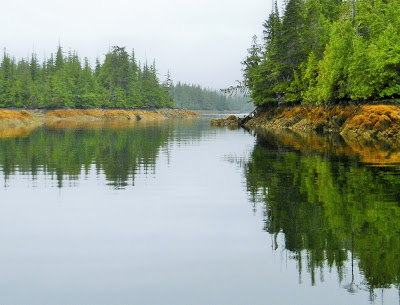We departed Ketchikan on
Revillagigedo Island at 1:40pm and made our way southeast along Revillagigedo
Channel, arriving at Foggy Bay on the Alaskan mainland around 7pm. Foggy Bay is the designated anchorage for
boaters to overnight before clearing customs at Prince Rupert in British
Columbia to the south, or at Ketchikan in Alaska to the north.
Mindful that Foggy Bay is entered through a
narrow passage lined with numerous rocks and reefs, we slowly made our way
through this intricate passage.
Although
Foggy Bay is tricky to enter, the bay is relatively sheltered from winds and the
mud bottom provides good holding for anchoring.
The following morning we continued our journey southward into “Dixon
Entrance,” the open body of water between U.S. Alaska and B.C. Canada. We passed Cape Fox on the Alaskan side of the
border, the site of an abandoned Tlingit village mentioned in the previous blog
post. Now in Canadian waters, we set our
clocks forward one hour - from Alaska Time to Pacific Time. We could see Dundas Island in the distance
where we would turn southeast into Chatham Sound. From Chatham Sound the next challenge was
winding through Venn Passage, locally called Metlakatla Bay, a series of twists
and turns with multiple navigation buoys and range markers. Having been through the passage on other
occasions, the course now seems familiar and routine.
Venn Passage brought us into Prince Rupert
Harbour where we stopped at the Lightering Customs Dock and cleared customs by
telephone. Now it was just a matter of
choosing a moorage facility and calling for available space. We wanted to check out the new marina that
just opened this year, named Cow Bay Marina.
Space was available and we were impressed with the all-new wooden docks
and nice shower and laundry facilities, a much needed and welcomed addition for
Prince Rupert. The new docks are located
near the grocery store and other shopping which made it convenient to pick up
needed supplies. Another nice benefit
are the security gates which are locked at night; guests of the marina are
provided keys during their stay.
The
only down side are the waves that sometimes make their way into the
marina. Although a “no wake” sign is
posted near the breakwater entrance, some boaters still speed past the marina
creating a wave that rolls the docks and subsequently the boats – boaters
should fender well when tied to the docks.
As we pulled into our assigned slip, I immediately recognized a familiar
boat, the Teka III owned by friends
Mary and Denis Umstot. We had met them
for the first time several years ago in Comox, B.C. and had also visited with
them at Fishermen’s Wharf in Seattle where they keep their vessel. Mary and Denis are world cruisers, having
made several ocean crossings and are well known for updating and editing the popular
book for boaters plying the oceans entitled “Voyaging Under Power” along with Mary’s
fascinating book entitled “Voyaging to the Mediterranean Under Power.”
We were excited to see them again and stopped
by their boat to say hello. After a
short visit, they invited us to come later that evening and join them for
dinner. We brought a hearty dish to
share and some wine for the evening which turned out to be mutually invigorating. We of course shared boating stories and the
challenge of laying plans for the future.
Like us, they had been to Alaska several times and having cruised long
distances for many years, they were looking for something new and different.
We too were looking
for something new and mentioned that we were thinking about selling Got d' Fever and buying a barge in Europe to cruise the canals. They perked up and thought that was a great
idea; they had been on a two-week barge trip in France some time ago and
absolutely loved it; they had wanted to spend more time on the canals. We told them about a new book we were reading
entitled “Carefree on the European Canals” by Michael Walsh. The book is a helpful reference not only for
the canals of France and the Netherlands, but also covers the process of
choosing and purchasing a barge. The
enthusiasm began to build and the four of us were soon looking online at
various barges for sale. We were
inspiring each other to think seriously about this possible new adventure;
“we will encourage each other along, let's keep in touch” was the theme of the
night. Getting together seemed to be a
serendipitous event. Who knows, maybe we
will be “buddy boats” in the Netherlands sometime in the near future.
 |
| Entering Foggy Bay |
 |
| Foggy Bay |
 |
| Departing Foggy Bay at low tide |
 |
| Cow Bay Marina at Prince Rupert, B.C. |
 |
| Got d' Fever at the new Cow Bay Marina Docks |
 |
| The Famous Teka III at Prince Rupert |
 |
| Mary and Denis Umstot |
No comments:
Post a Comment